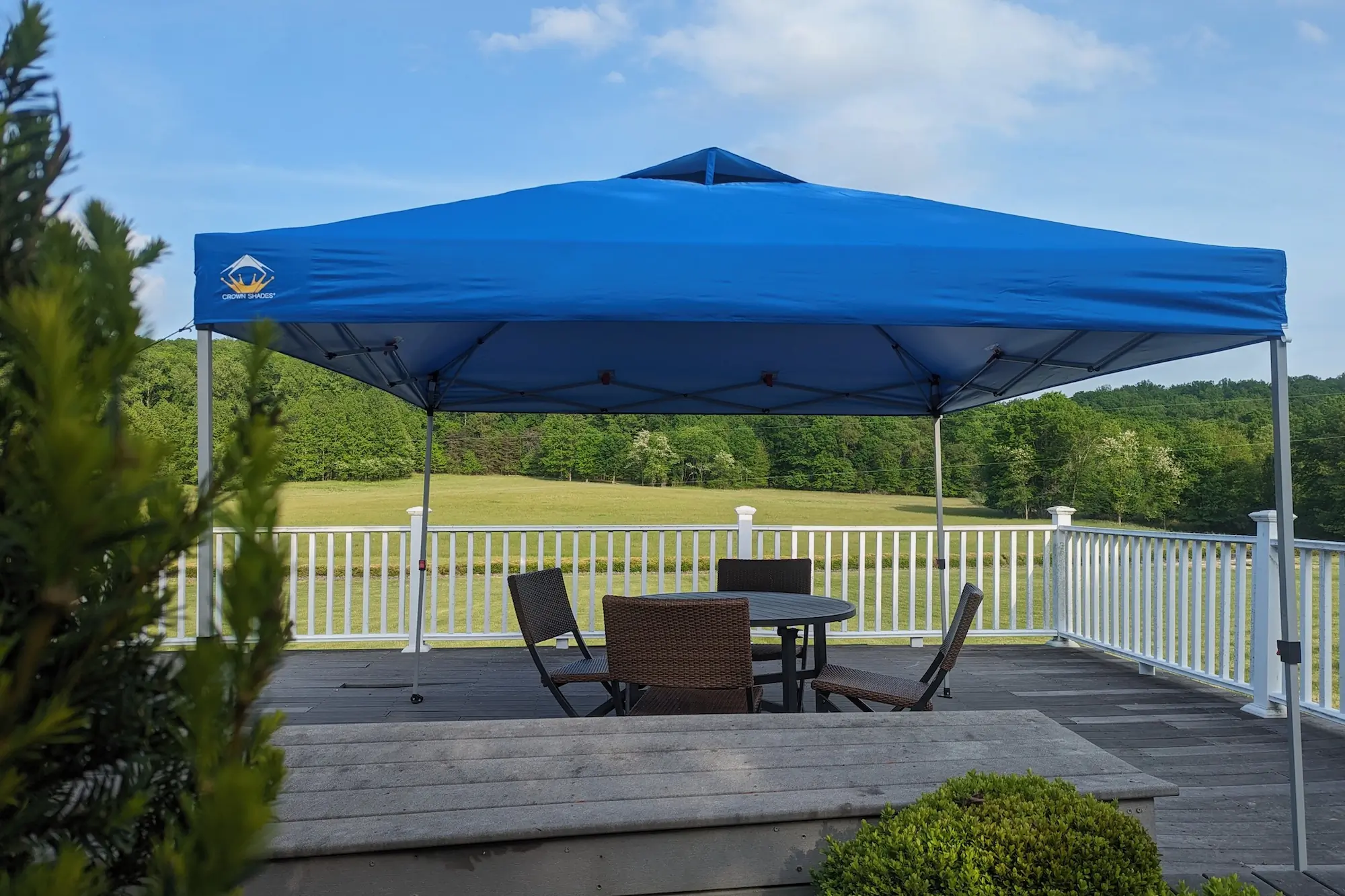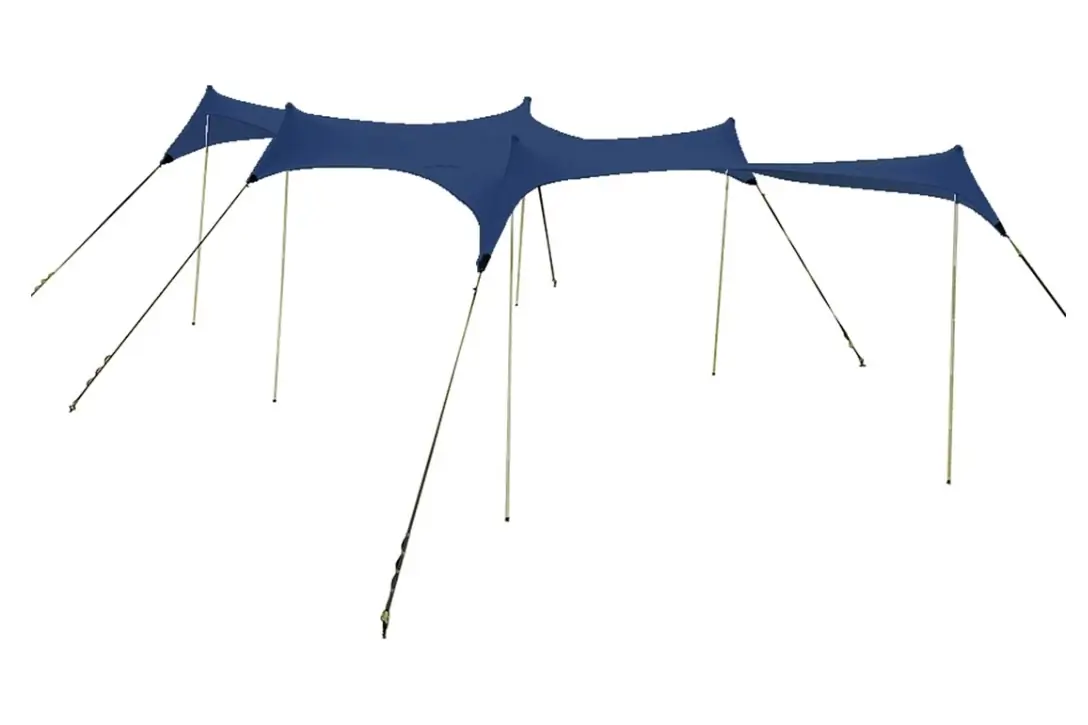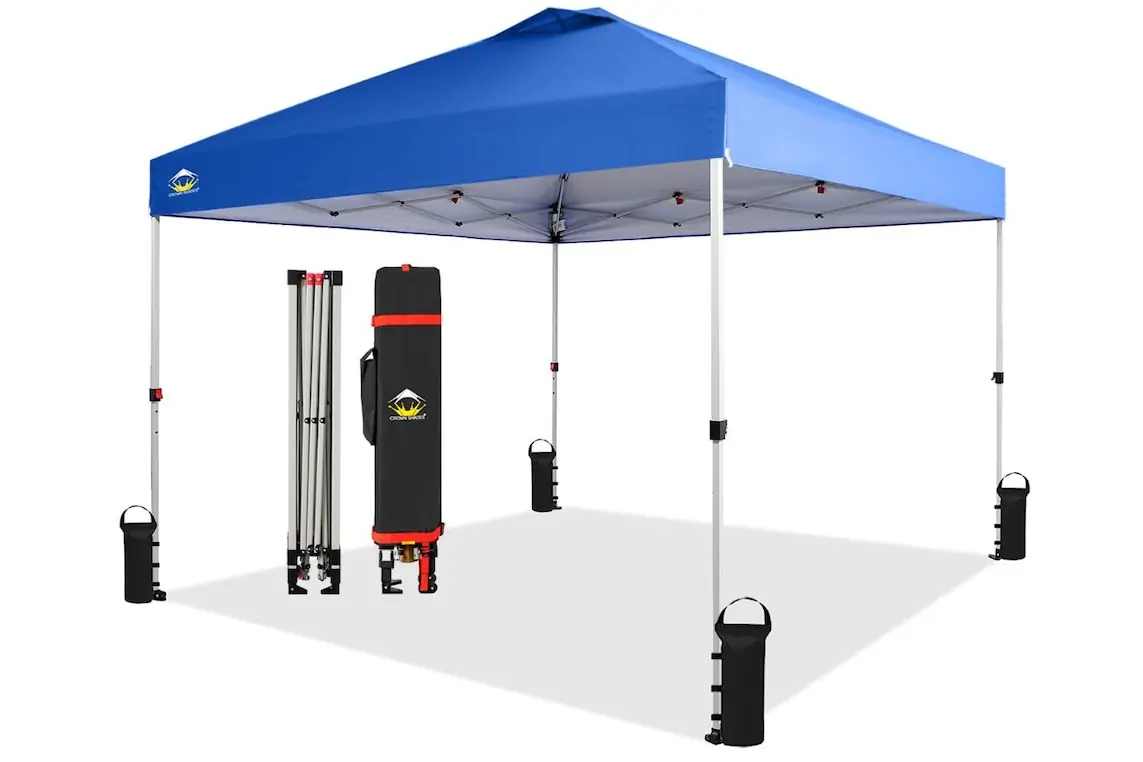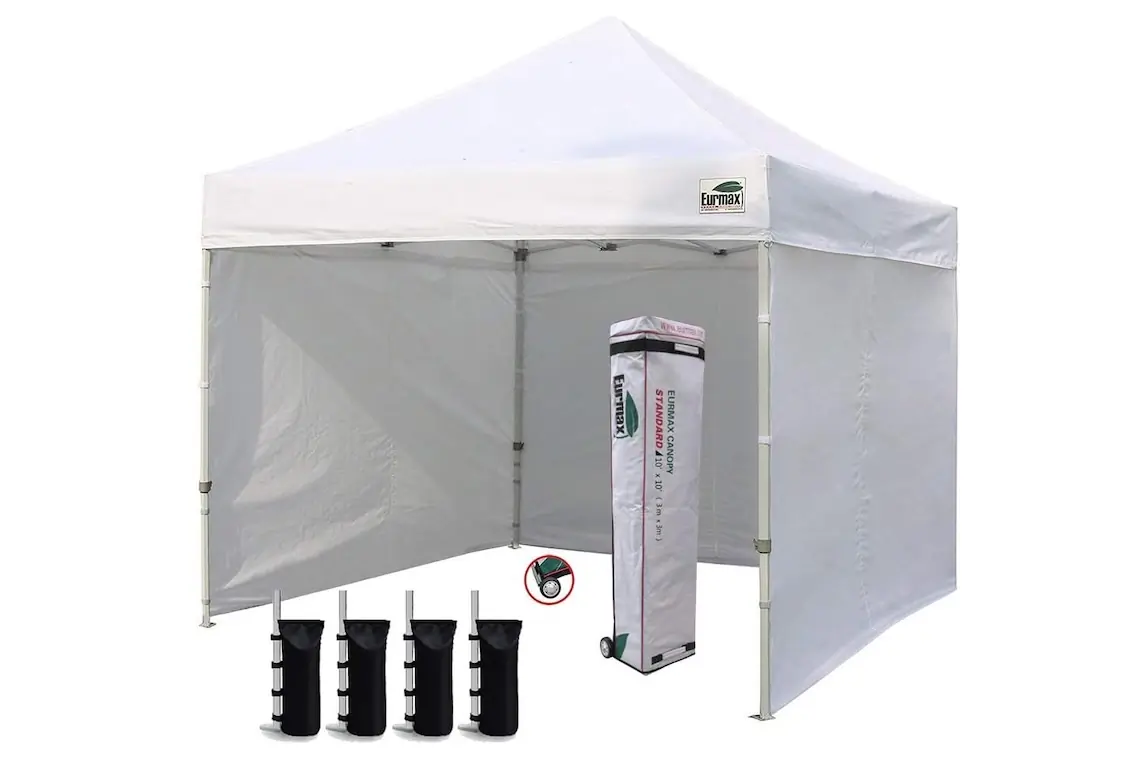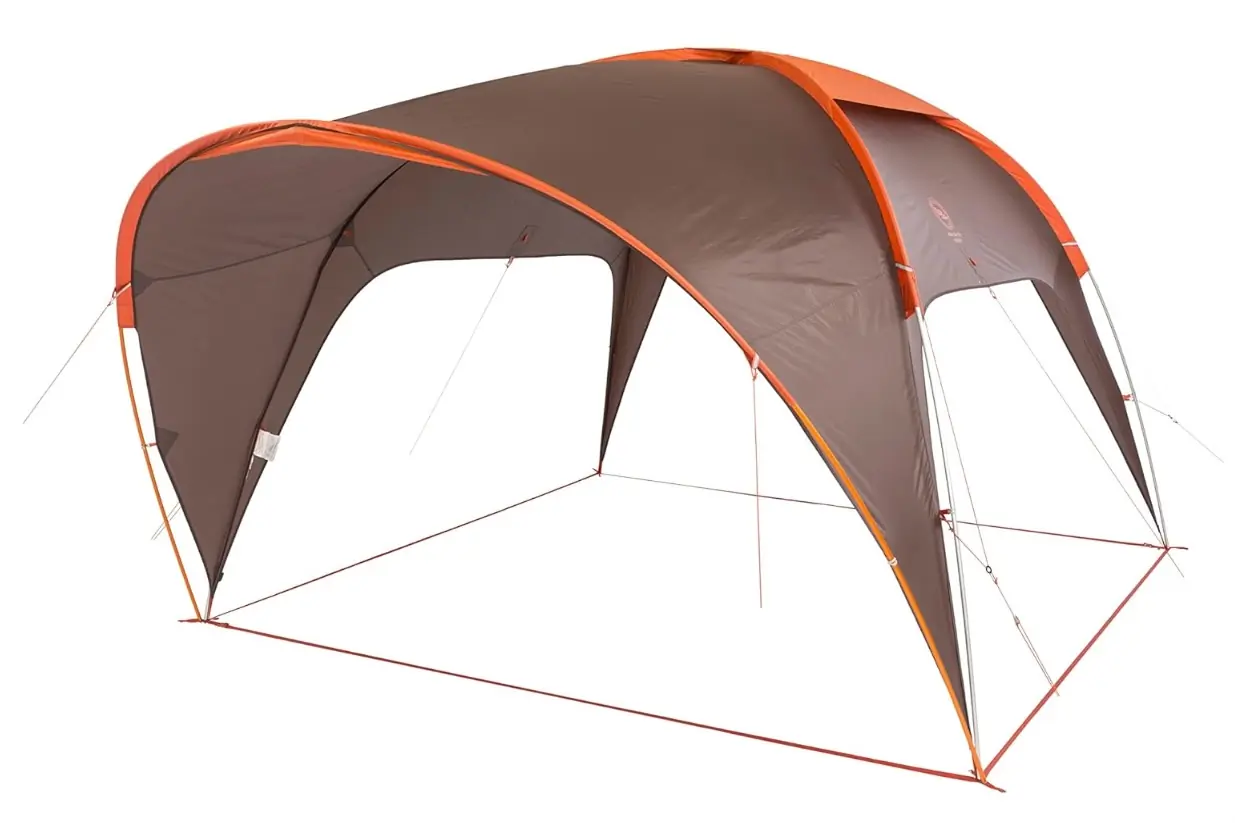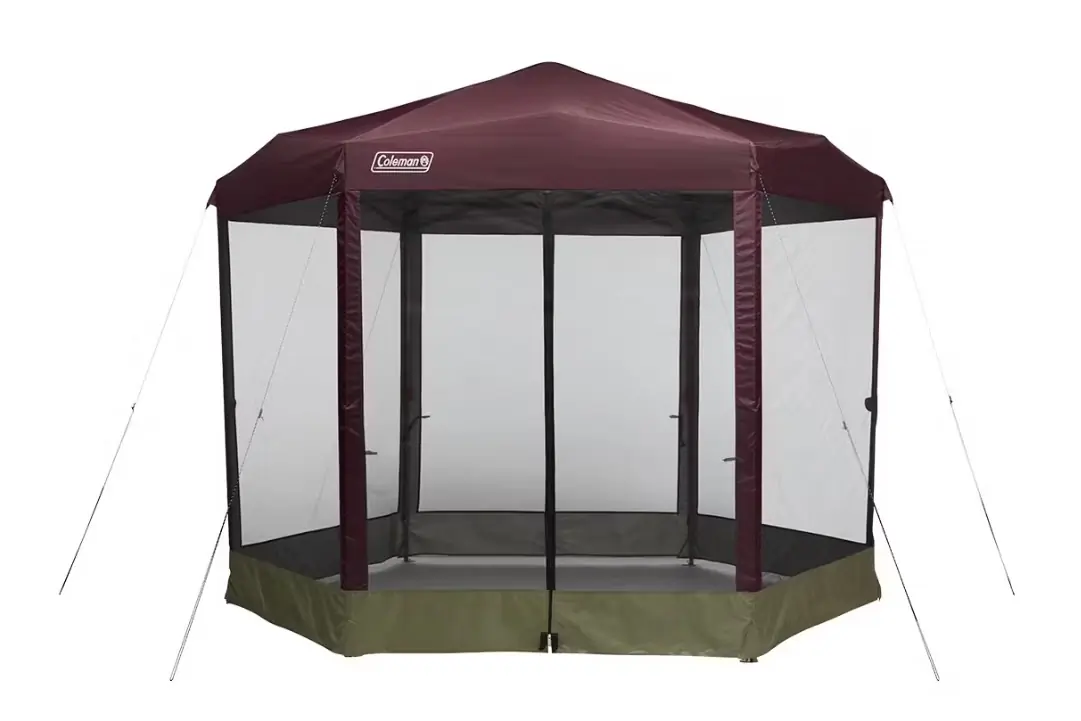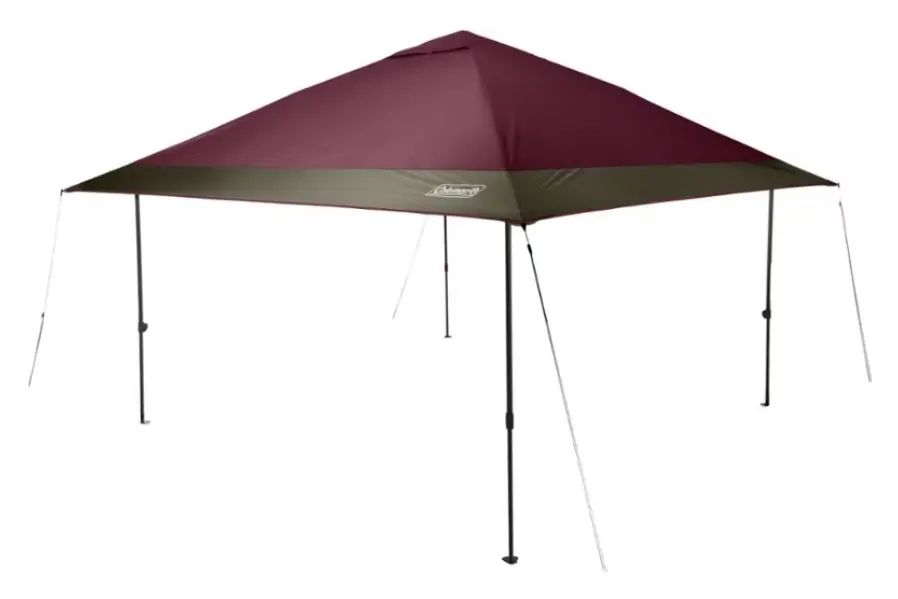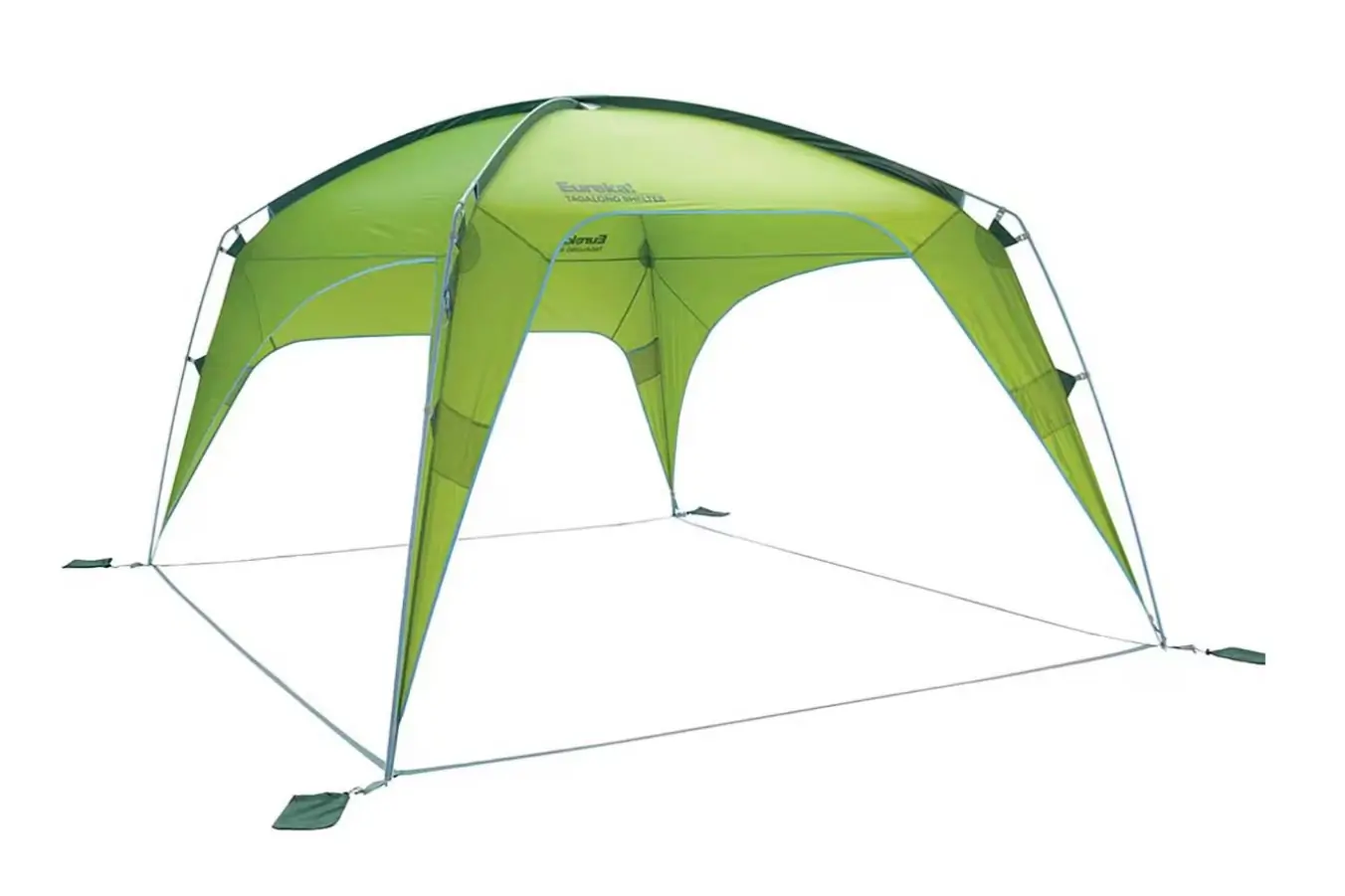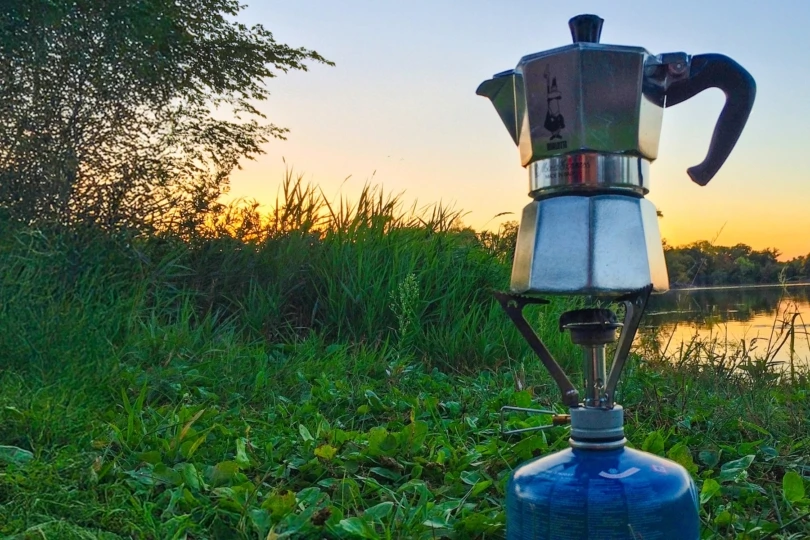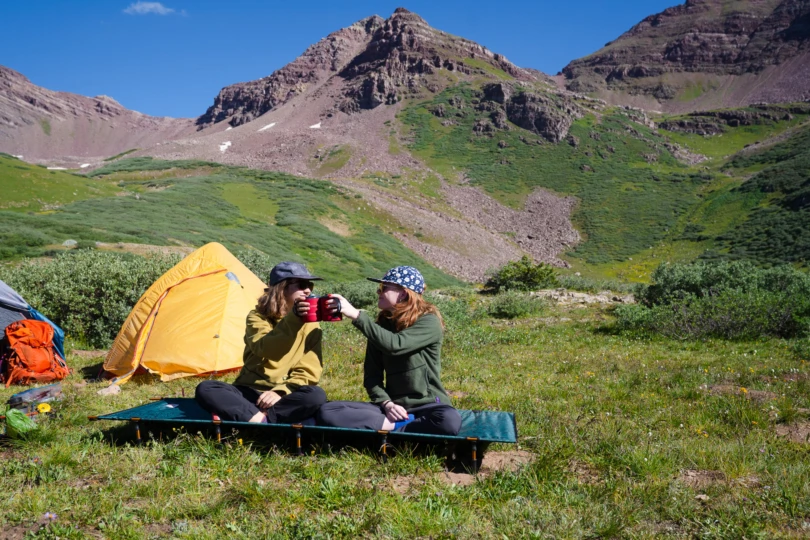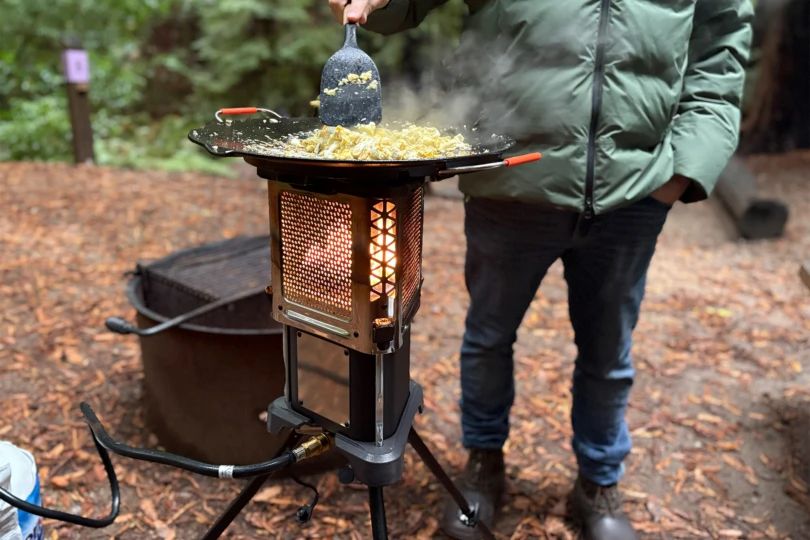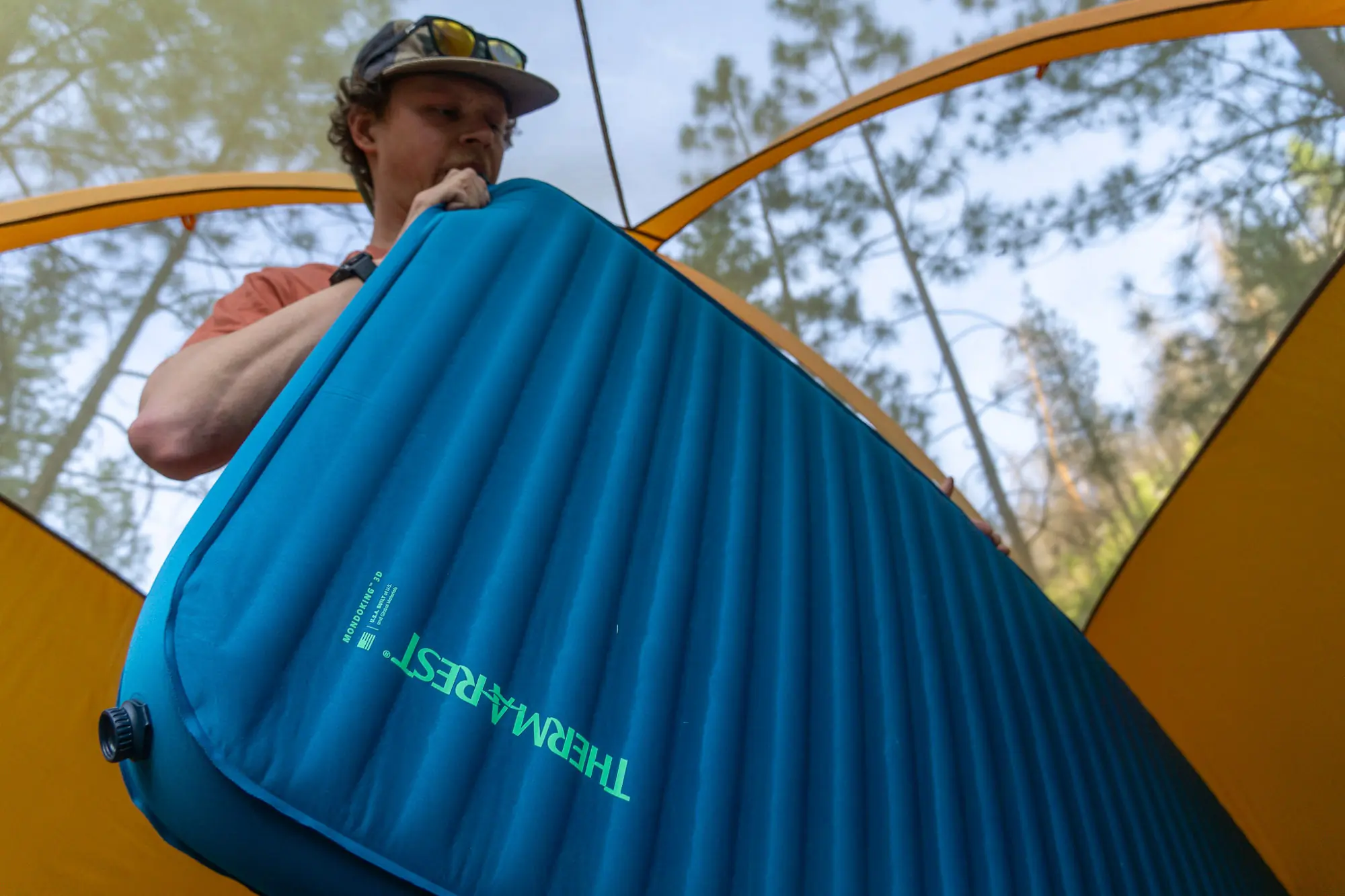Whether you’re looking for a sturdy backyard shade structure or a packable sun and rain shield for your next camping trip, canopy tents are a simple and effective way to optimize your time spent outdoors. To help with your future family hangouts, beach days, camping trips, and event hosting, we’ve tested the best canopy tents of 2025.
Canopy tents are surprisingly easy to set up and secure, providing quick and effective protection from the sun and weather. They’re great for personal use at the beach, in the backyard, or on your next car camping trip, and can be ideal for small businesses and start-ups. Caterers, craft fairs, farmer’s markets, and food vendors often use canopy tents for marketing and sales.
From classic pop-ups to newfangled tent canopies and designs, we tested seven of the best models on the market. At his home on a sprawling farm in Virginia, author Andrew Potter put each model through its paces during spring in the southeastern US. We examined important factors like coverage, ease of setup, portability, stability, special features, and best uses to find the best canopy tents for all users.
Editor’s note: We updated this guide on November 11, 2024, with the addition of a Price & Value section to explain cost-related considerations.
The Best Canopy Tents of 2025
Neso Party Tent
- Shade material: Stretchy nylon/Lycra
- Coverage: 11' x 22'
- Height: 8'
- Setup time (2 people): 10-15 min.
- Carrying case: Backpack
- Weight: 23 lbs., 7 oz.
Pros
- Versatile
- Lots of shade and coverage
- Easy to transport
- Rust-resistant aluminum poles
- Head-turner when deployed
Cons
- Water can pool on canopy
- Moderately expensive
Crown Shades 10 x 10 Pop-up Canopy
- Shade Material: UPF 50+ 150D Silver-coated canopy
- Coverage: 10 ft. x 10 ft.
- Height: Canopy edge: 6 ft., 2 in., Apex: 9 ft., 4 in.
- Set Up Time (2-people): 10 minutes
- Carrying Case: Rolling bag
- Weight: 37 lbs.
Pros
- Easy setup
- Professional look
- Sandbags for security on pavement
- Reasonable price
- Lots of color and pattern options
Cons
- Not the sturdiest feel
- Wouldn’t recommend in high winds
Eurmax USA 10′ x 10′ Standard Pop-up Canopy Tent
- Shade Material: 500D Polyester Meets CPAI-84 Fire Certification
- Coverage: 10 ft. x 10 ft.
- Height: Canopy edge: 7 ft., Apex: 11 ft.
- Set Up Time (2-people): 15-25 minutes
- Carrying Case: Rolling bag
- Weight: 61 lbs.
Pros
- Industrial grade materials
- Classic look
- Sturdy posts and latching mechanisms
- Fully featured
Cons
- Door/window wall might need custom anchoring in windy weather
- Enclosed feel with walls on
- Heavy
Big Agnes Sage Canyon Shelter Deluxe
- Shade Material: Polyester taffeta with 1500 mm PU water-resistant coating
- Coverage: Floor area: 100 sq. ft., vestibule: 29 sq. ft.
- Height: 84 in.
- Set Up Time (2-people): 10 minutes
- Carrying Case: Classic tent bag
- Weight: 12 lbs., 10 oz.
Pros
- Lightweight
- Packable
- Guy lines attached to shelter
- Accessories make it extremely versatile
Cons
- Not the best for extreme weather
- Accessory walls and mesh insert sold separately
- Expensive
Coleman Back Home 10.5 x 9 Screen Canopy Tent
- Shade Material: UPF 50+, material not specified
- Coverage: 10.5 ft. x 9 ft.
- Height: 9 ft.
- Set Up Time (2-people): 15-25 minutes
- Carrying Case: Wheeled carry bag with shoulder strap
- Weight: 48 lbs., 11 oz.
Pros
- Screened enclosure keeps bugs out
- Wheeled carry bag
- Steel posts are sturdy
- Extra guy-lines for stability
- Two entrances
Cons
- Screen can tear if you don’t take care during set up and take down
- Moderately expensive
Coleman Oasis 10 x 10 Canopy
- Shade Material: UPF 50+ canopy, material not specified
- Coverage: 10 ft. x 10 ft.
- Height: 8 ft., 8 in.
- Set Up Time (2-people): 10 minutes
- Carrying Case: Rolling bag
- Weight: 37 lbs., 14 oz.
Pros
- Easy set up
- Overhanging eaves offers extra coverage
- One Peak push for set up
- Nicer looks than other pop-up canopies
Cons
- No anchor-points on posts
Eureka Tagalong Shelter
- Shade Material: 50+ UPF Taffeta
- Coverage: 50 sq. ft.
- Set Up Time (2-people): 5-10 minutes
- Carrying Case: Tent bag with shoulder strap
- Weight: 7 lbs., 3 oz.
Pros
- Lightweight
- Easy setup
- Webbing base holds the shape well
- Packable and easily portable
Cons
- No ceiling vent to reduce wind drag
Canopy Tent Comparison Chart
| Canopy Tent | MSRP | Shade Material | Coverage | Height | Carrying Case | Weight |
|---|---|---|---|---|---|---|
| Neso Party Tent | $300 | UPF 50+ stretchy nylon/lycra | 11 ft. x 22 ft. | 8 ft. | Backpack | 23 lbs., 7 oz. |
| Crown Shades 10 x 10 Pop-up Canopy | $140 | UPF 50+ 150D Silver-coated canopy | 10 ft. x 10 ft. | Canopy edge: 6 ft., 2 in., Apex: 9 ft., 4 in. | Cover bag and wheels | 37 lbs. |
| Eurmax USA 10 x 10 Standard Pop-up | $259 | 500D Polyester Meets CPAI-84 Fire Certification | 10 ft. x 10 ft. | Canopy edge: 7 ft., Apex: 11 ft. | Rolling bag | 61 lbs. |
| Big Agnes Sage Canyon Shelter Deluxe | $450 | Polyester taffeta with 1500 mm PU water-resistant coating | 64 sq. ft. | 7 ft. | Classic tent bag | 12 lbs., 10 oz |
| Coleman Back Home 10.5 x 9 Screen Canopy Tent | $275 | UPF 50+, material not specified | 10.5 ft. x 9 ft. | 9 ft. | Wheeled carry bag with shoulder strap | 48 lbs., 11 oz |
| Coleman Oasis 10 x 10 Canopy | $190 | UPF 50+ canopy, material not specified | 10 ft. x 10 ft. | 8 ft., 8 in. | Rolling bag | 37 lbs., 14 oz. |
| Eureka Tagalong Shelter | $260 | UPF 50+ Taffeta | 50 sq. ft. | 6 ft., 3 in. | Tent bag with shoulder strap | 7 lbs., 3 oz. |
How We Tested Canopy Tents
At GearJunkie, we love being outdoors, but we know that adapting our outdoor space to our needs can make our experience even better. When the sun is shining, wind is blowing, or some weather rolls in, we’re always happy when we’re prepared to protect ourselves from the elements. Over the years, we’ve learned that canopy tents are a great way to shield ourselves from the sun and changing weather.
For our canopy tent buyer’s guide, we tasked frequent GearJunkie contributor Andrew Potter with testing seven of the best models we could find. Andrew currently lives on a large farm in Virginia, where he spent months testing these canopy tents in the highly variable spring weather of the southeastern U.S. With everything from decks, patios, grassy lawns, the back woods, you name it, Andrew has the ideal testing ground for using these tents on a wide range of surfaces and situations.
To determine the best pop-up tents, Andrew paid close attention to every detail from set up to take down. He looked at everything from the coverage area to ease of setup and quality of the build and compared ease of use to functionality.
Pop-up tents are notorious for turning into wind sails in harsh weather, so we left them out for at least a night while some variable southeast spring weather was rolling through. We looked at waterproofness, sun protection, appearance, weight, portability, and anchor systems. Whatever your concerns, we’ve addressed them.
With an overwhelming number of brands and styles available today, it can be difficult to make a definitive decision. We made sure to test best-selling tents, innovative designs, and hybrid pop-ups to ensure this list is comprised of the best canopy tents on the market. As new and interesting models hit the market, we’ll be sure to test those, too, to keep this guide updated with the best canopy tents for all users.
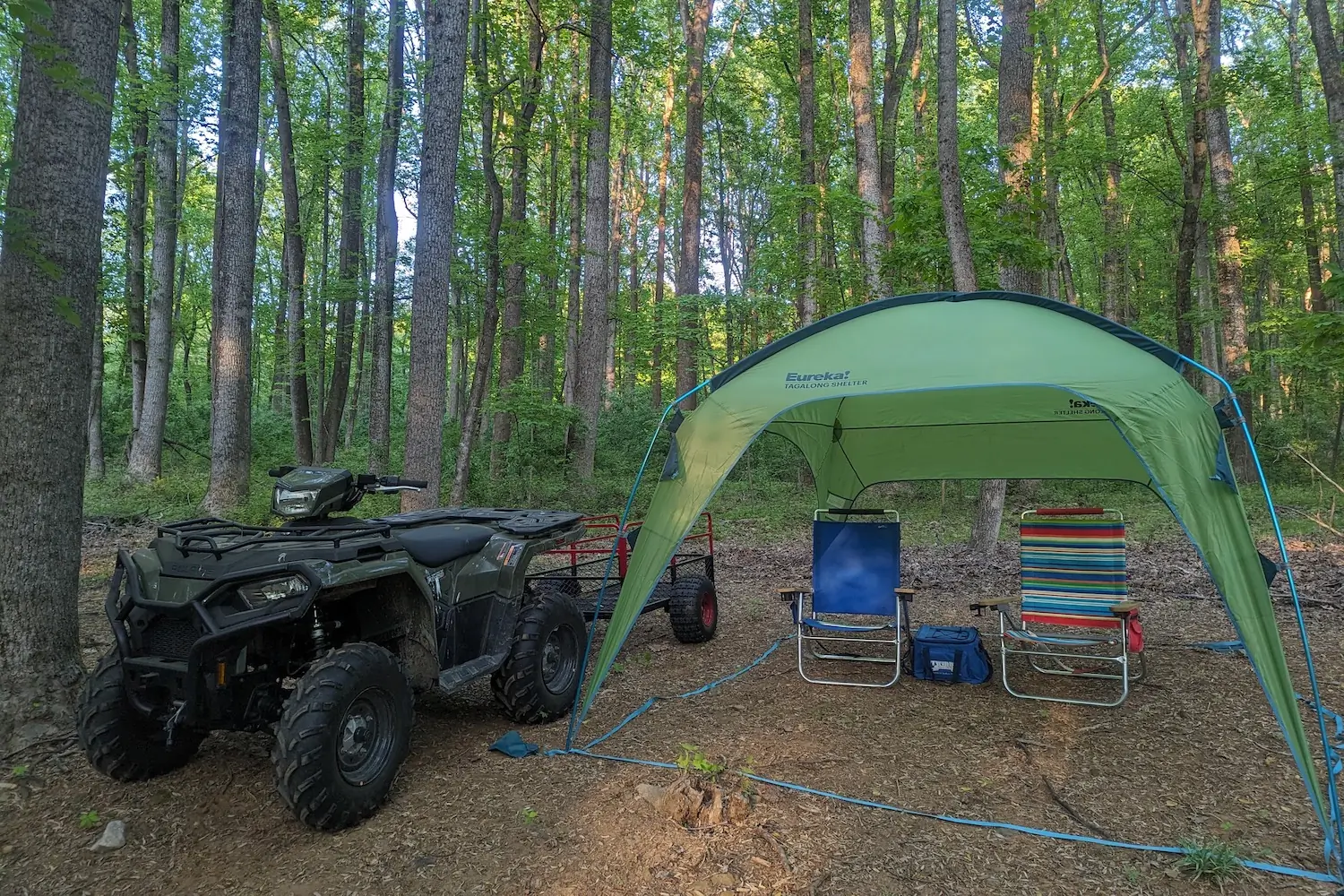
Buying Advice: How to Choose a Canopy Tent
To know what type of canopy tent to purchase, it’s most important to consider your intended use. Are you looking for a simple and easily portable shade for the beach or park? Or do you need something suitable for parking lots at swap meets or the farmer’s market?
Is packability a concern, or are you okay with something heavier? How big does your canopy need to be? By answering some simple questions, you should be able to zero in on the model that will work best for your needs. If you need more help deciding what kind of tent is right for you, check out our handy guide on how to choose a tent.
All of the options on this list are fairly versatile, but some — like the Eurmax 10 x 10 — have an intended function where they excel. Below, we’ll outline the basic features and functionality of canopy tents to ensure you’ve made the necessary considerations.
Coverage and Clearance
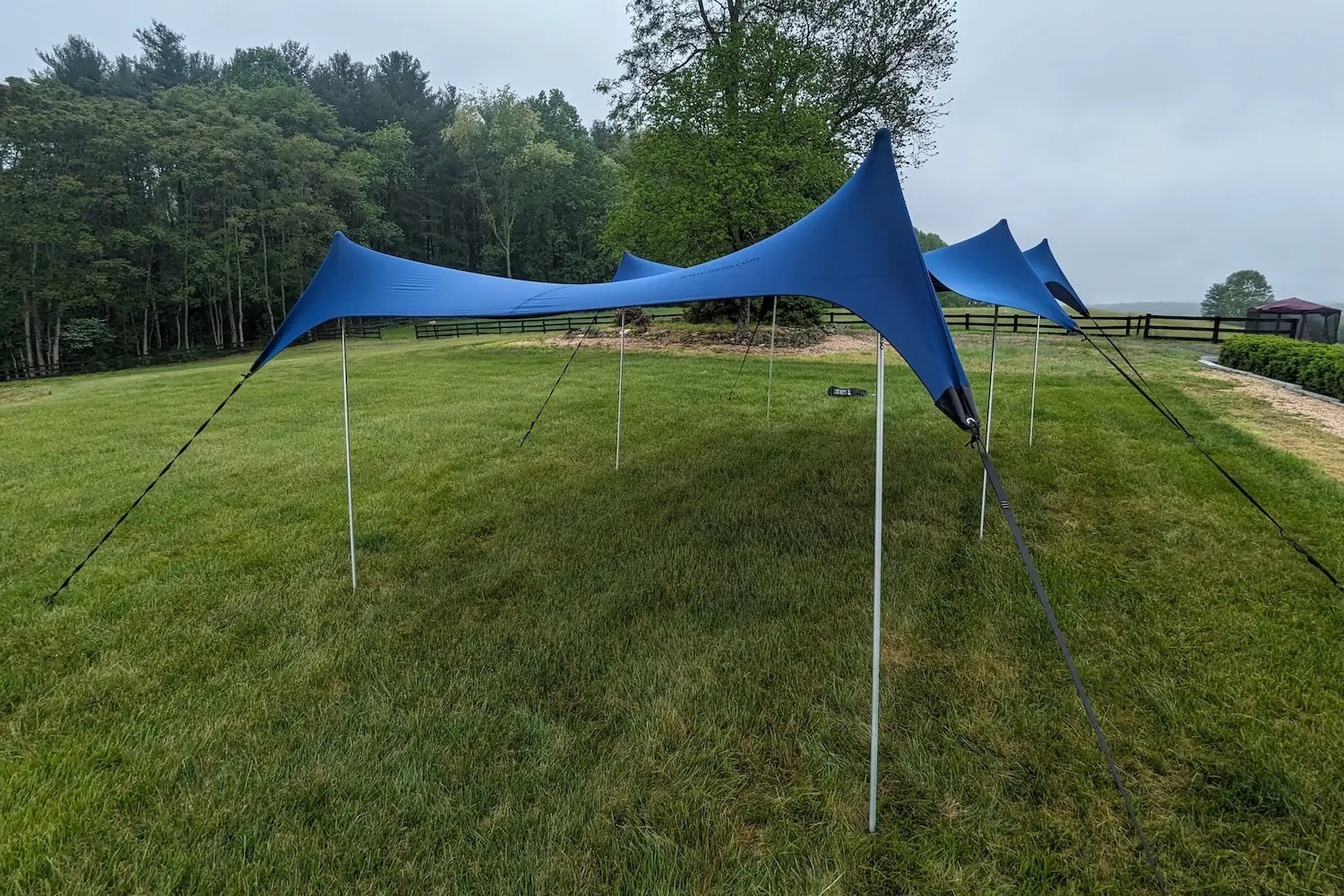



Depending on what you intend to use your canopy tent for and how many people or what you’re trying to cover with it, size is an important consideration. For both shade coverage and height clearance, size absolutely matters. On this list, the coverage ranges from 11 x 22 feet (Neso Party Tent) to 8 feet (Eureka Tagalong). Knowing how many people you’ll have to house under the canopy is a simple, but important consideration.
All of the pop-up canopies we tested were 10 x 10 feet in size. This is pretty much the standard size that works for most people’s needs. If you need something smaller or larger, most pop-ups come in a range of sizes so you can pick what works best for you.
For example, the Eurmax USA Standard Canopy can be ordered in five different sizes between 8 x 8 feet and 10 x 20 feet. Similarly, the Crown Shades pop-up comes in a smaller 8 x 8 foot size, while the Coleman Oasis comes in a larger 13 x 13 foot size.
Beyond the coverage area, the height of a canopy tent may play a role in how useful it is. Do you want to be able to stand up and move around so you can cook under your canopy, or will you mostly be sitting on camping chairs or at a picnic table?
The Eureka Tagalong has the lowest standing space beneath at 75 inches, whereas the average height of the other options is around 80 inches. Some, like the Eurmax, have cross supports paralleling the ground, whereas others, like the Coleman Back Home, have a conical roof that offers more headspace in the center.
Setup
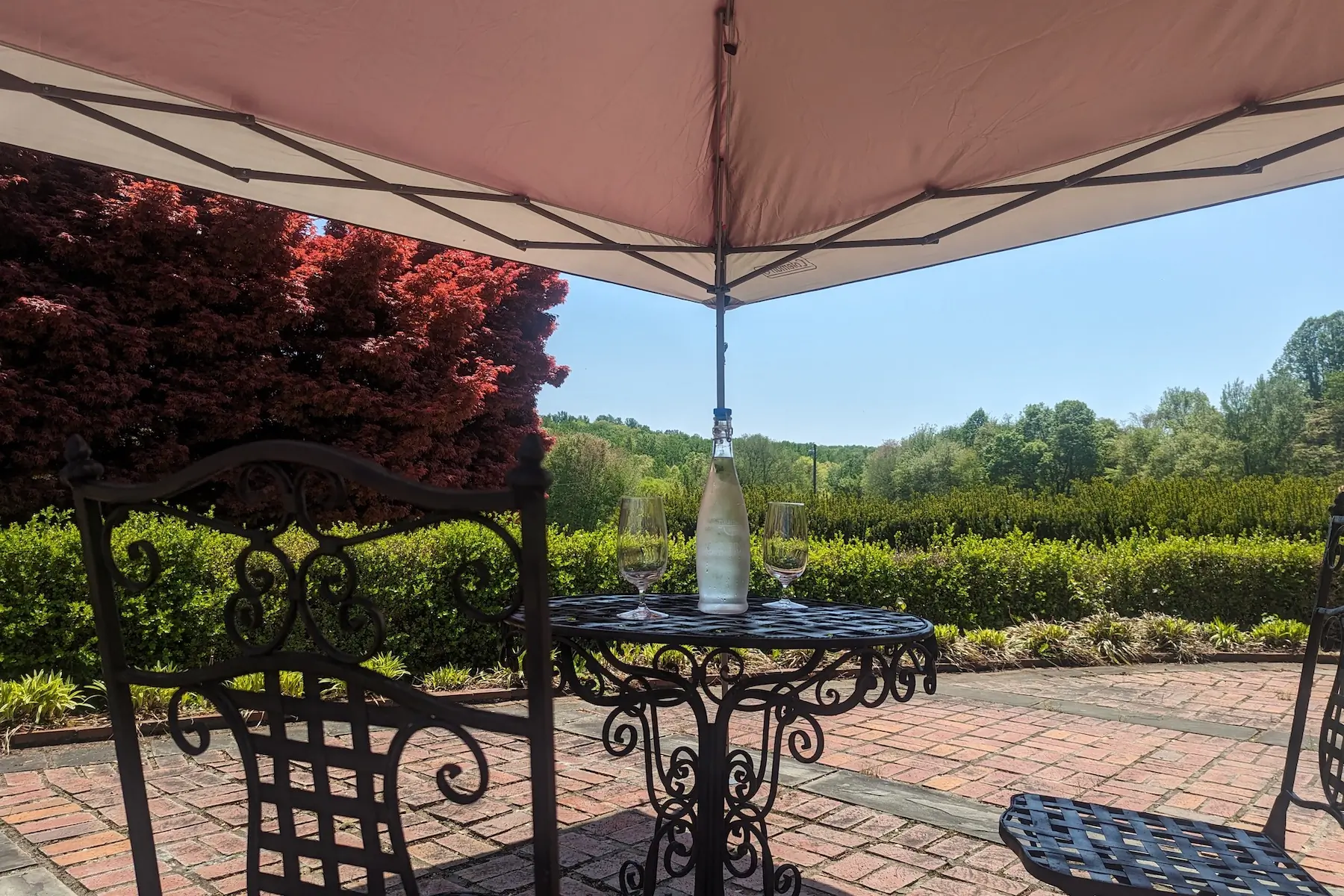



Depending on where you’re erecting your pop-up tent, both the set-up time and style can be critical. All of the models we tested are pretty quick and easy to set up, although some are a bit easier than others. The Eureka Tagalong, for example, sets up like a traditional camping tent but only requires two poles, and it can be up and secured quickly. For beach days where claiming a spot before relaxation is a priority, the Tagalong is ideal.
Traditional pop-ups, like Crown Shades 10×10, Eurmax, and the Coleman Oasis, don’t take long to erect, but the initial setup typically takes a little longer to attach the canopy over the frame. For subsequent set-ups and break-downs, you can often just leave the canopy on top, which expedites the process.
Additionally, depending on the surface or the wind conditions, you’ll often spend extra time securing them. The larger the canopy, the more you’ll have to anchor it to keep it grounded.
Anchor Styles
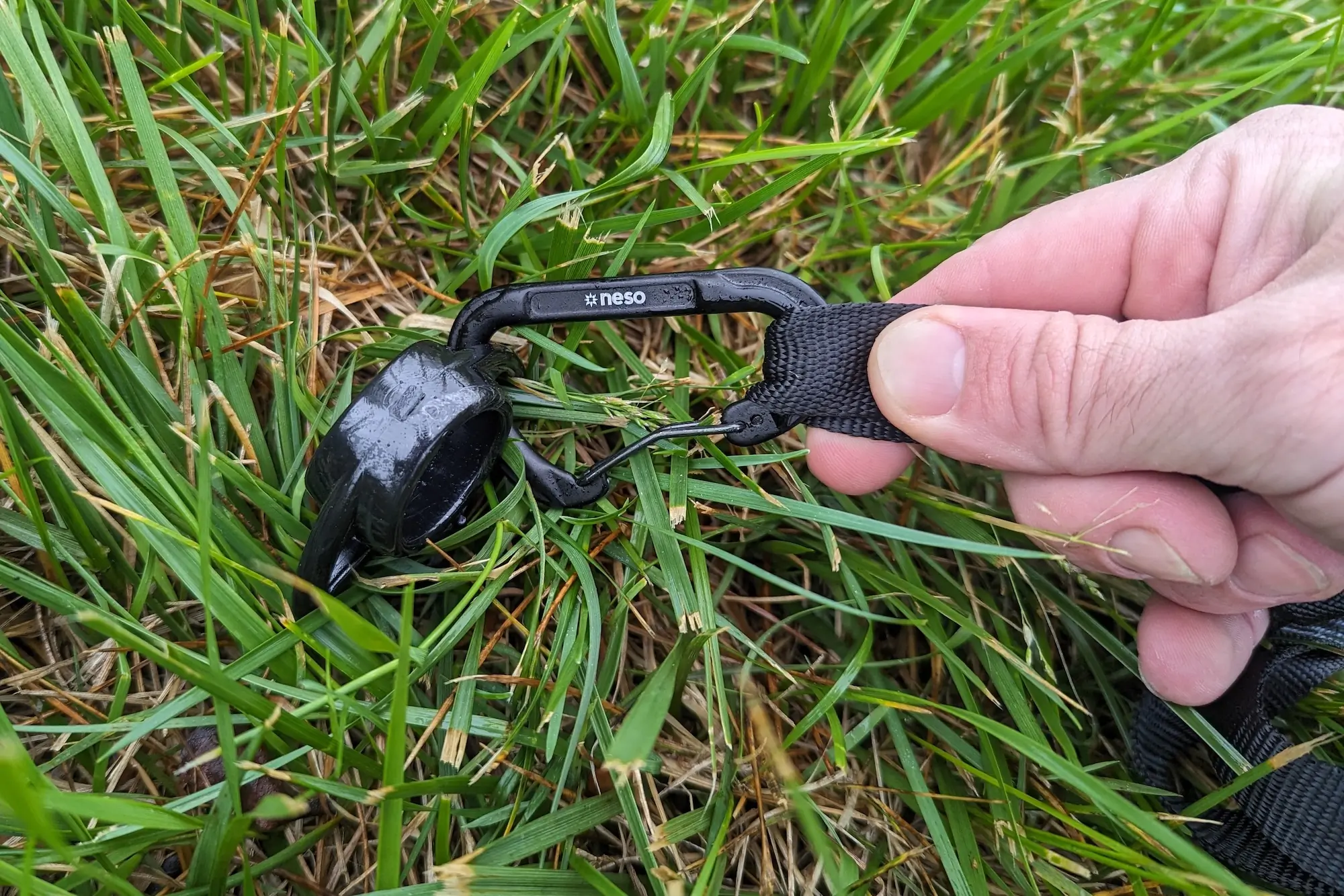



If you’ve ever seen a pop-up canopy go flying in the air, then you know how susceptible they can be to the wind and the importance of anchoring them securely. Not only is a flying pop-up extremely dangerous, but it will likely cause significant damage to your investment.
The best pop-up tent on our list, the Neso Party Tent, gives you the option of sandbags or ground screws. If necessary, you could use both. Having both options makes the Party Tent impressively versatile and functional in both a beach and grass setting.
The Party Tent’s stakes really shine above the rest. The screws are strong, and as you twist them into the ground you can feel the resistance. Unlike normal stakes, you can yank on them without them dislodging. All of Neso’s tent models utilize these stakes, and for good reason.
All of the options on the list come with at least the option to use guy lines for stake anchoring, but that’s not an option on hard surfaces. The Eurmax Pop-up, for example, is designed for event use, and we’ve read that many regular users will purchase additional sandbags separately to ensure optimal security on a variety of surfaces. Yes, it already comes with sandbags, but adding more can give you extra peace of mind if you’re unable to anchor it down in other ways.
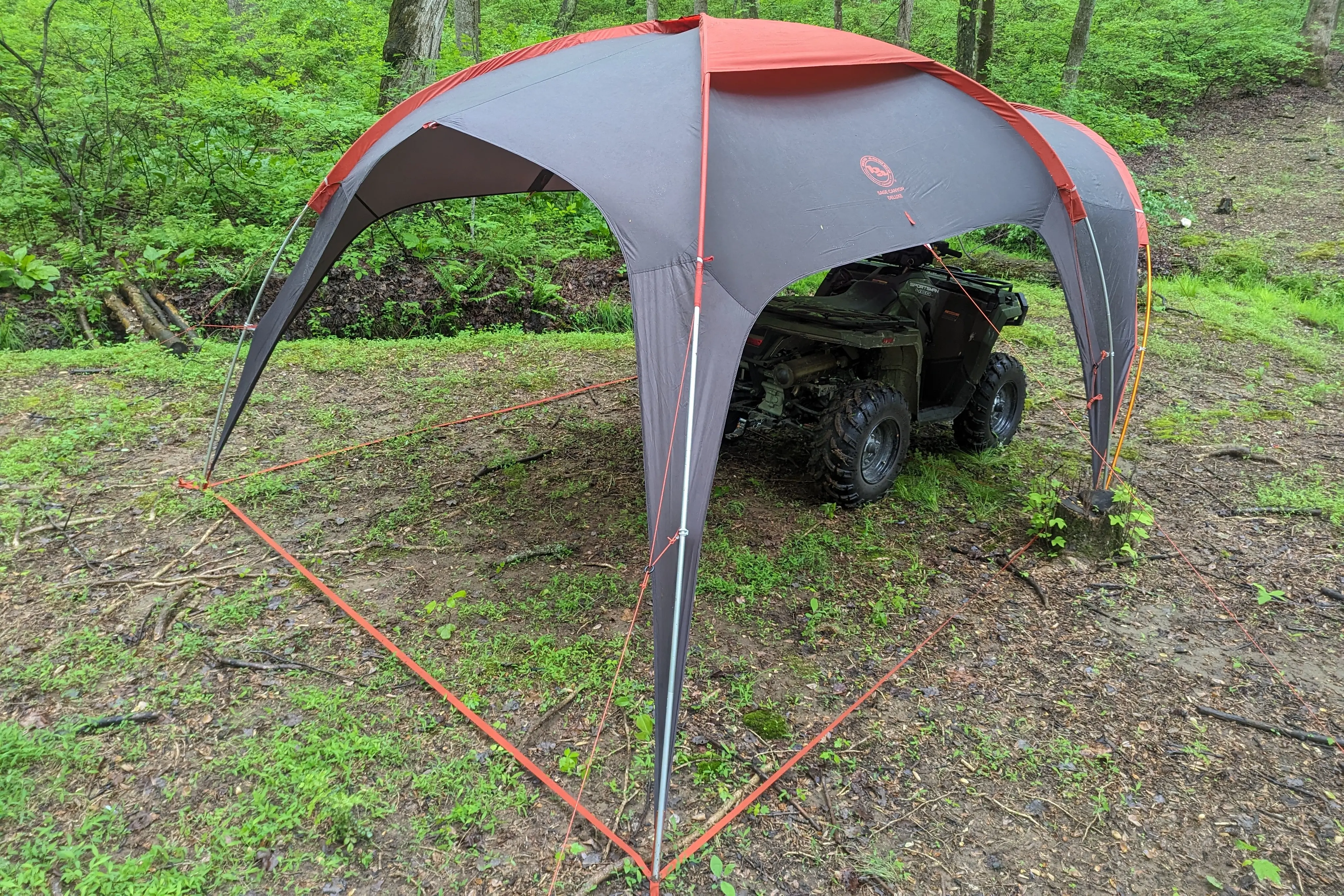



Both the Big Agnes Sage Canyon Shelter Deluxe and the Eureka Tagalong Shelter are more like camping tents than pop-up canopies. As such, they anchor to the ground by more traditional methods like tent stakes at the corners and guy lines for extra stability.
Portability
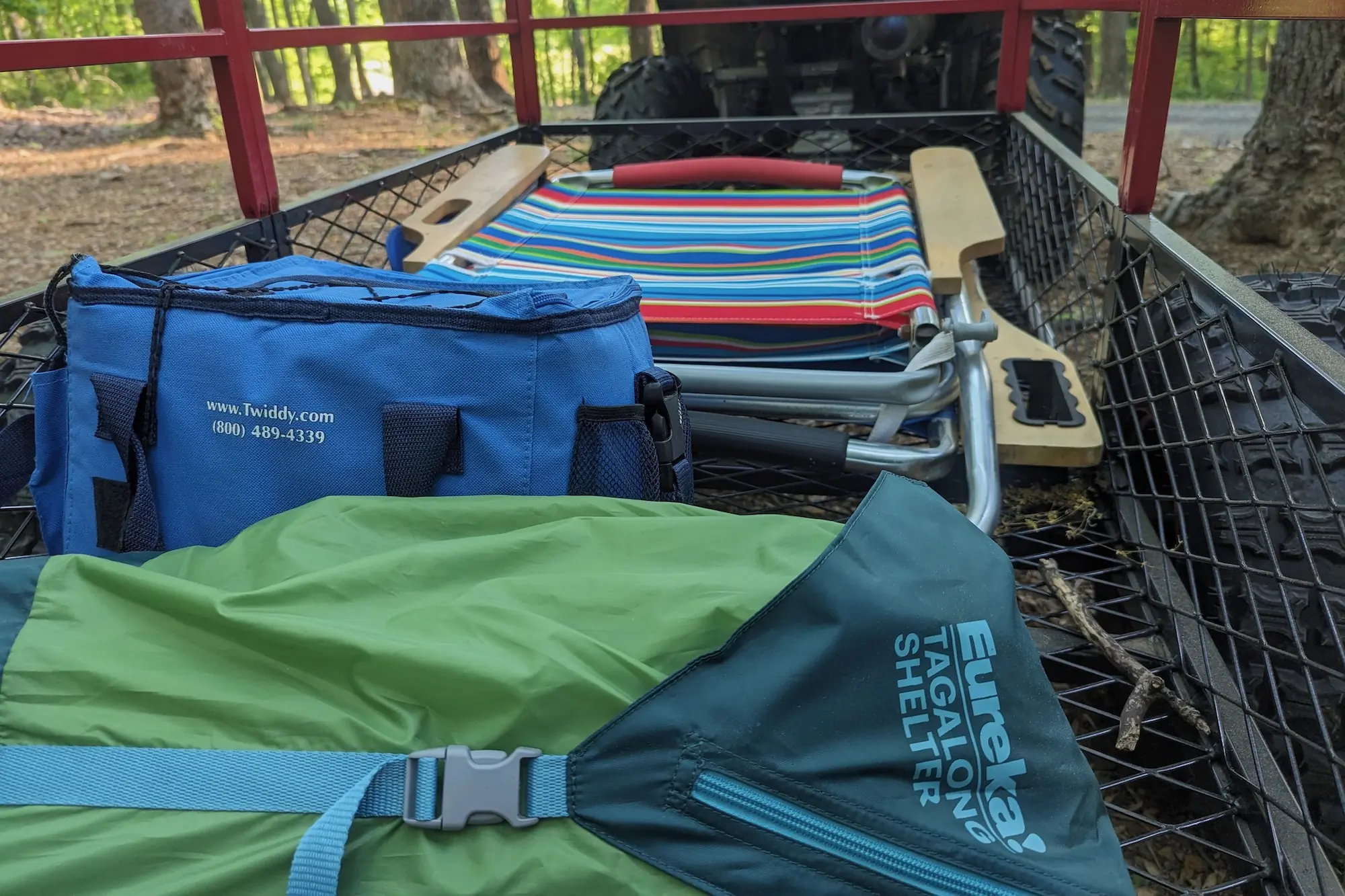



Depending on how and where you’re using your canopy tent, portability may or may not be a huge concern. All of the models we tested are portable, but they vary pretty wildly in terms of weight and collapsed size. All of them will fit into the trunk of your car or a truck bed, but some take up significantly less space than others.
In general, pop-up canopies are the heaviest and largest. This is due primarily to their larger metal frames. Still, they collapse down to an impressively small size for what they are. All of the models we tested also come with storage/transport covers and have wheels so that you can roll them across firm surfaces.
The models we tested range in weight between 37 pounds (Crown Shades 10 x 10) and 61 pounds (Eurmax 10 x 10), with the Coleman Back Home and Oasis falling in between those figures. Those weights mean that you probably won’t want to carry any of them for a long distance, but they are fairly easy to roll around or toss into your beach wagon or utility cart to get it where you need to go.
However, if you’re traveling, car camping, or hiking to a lake or beach spot, portability and weight are major concerns. Both the Big Agnes Sage Canyon and Eureka Tagalong are under 13 pounds packed and can easily be tucked away in a trunk or backpack.
If you’re not quite sure where you’ll be setting up camp for the day or your vehicle is already stuffed to the gills with other gear, a lighter and more compact option that’s easy to carry and transport may be the best option.
Surprisingly, the largest coverage canopy we tested, the Neso Party Tent, is shockingly portable. While it provides 11 x 22 feet of coverage, it weighs just 23 and a half pounds, and it collapses down into a storage bag with backpack straps. Even if you need to walk a considerable distance to get to your favorite beach or hangout spot at the park, Neso has made it easy to bring the Party Tent with you.
Walls and Screens
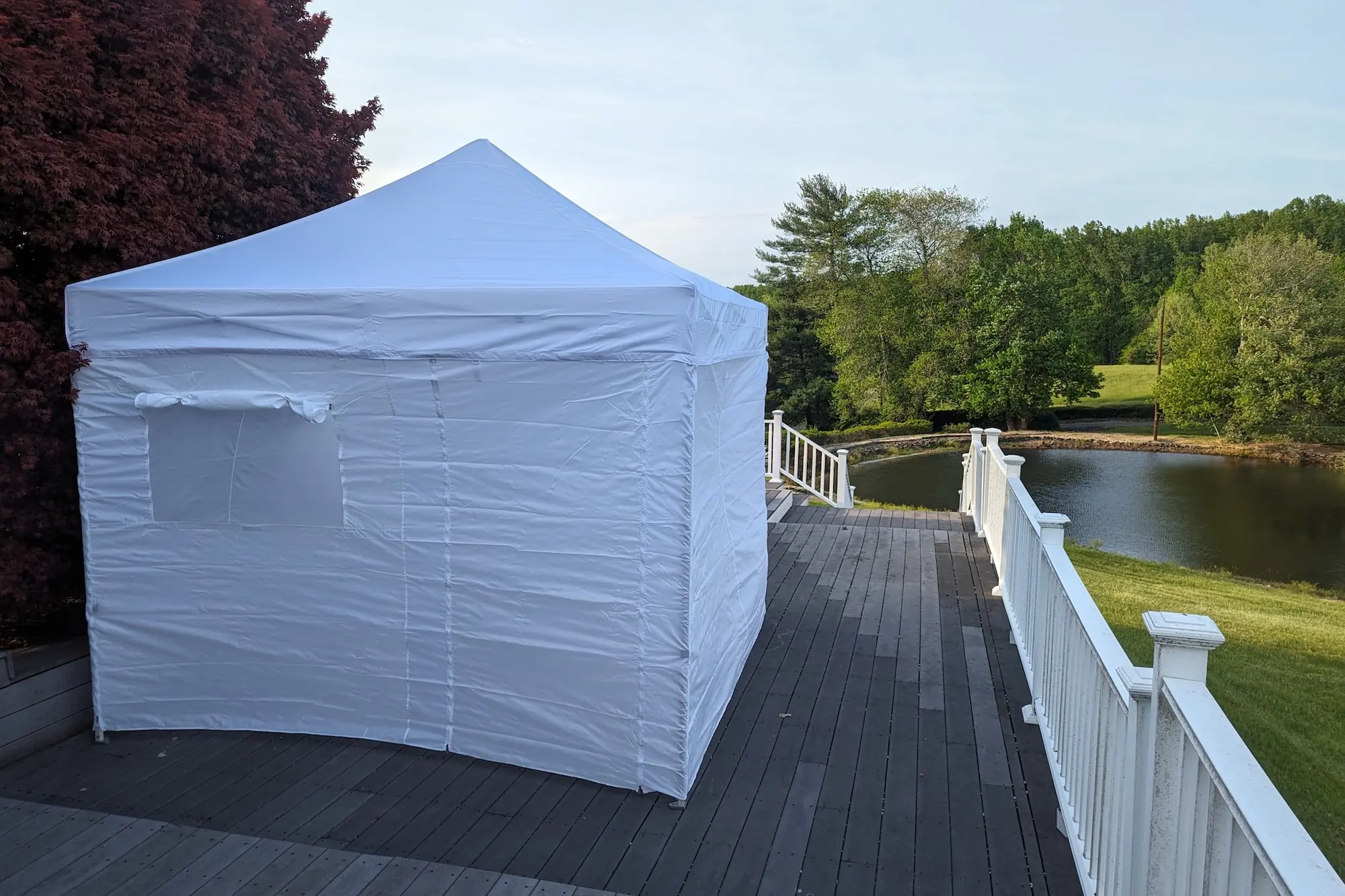



If you only need your canopy tent to protect from overhead sun and precipitation, then you may never need or want walls or screens. But if you’re setting up to sell some crafts at a local fair or want some additional protection from the wind or pesky bugs, then it might be worth looking into models that include walls or screens.
The Eurmax 10 x 10 Standard Pop-up we tested comes with optional walls that you can put on separately to create anything from a fully walled-in space to one that is wide open. If bugs are a concern, the Coleman Back Home Screen Canopy comes with mesh walls to help keep them at bay.
If you’re after a more portable option, the Big Agnes Sage Canyon Shelter Deluxe can be fitted with a mesh liner and/or accessory walls (sold separately) to dial it in for your needs.
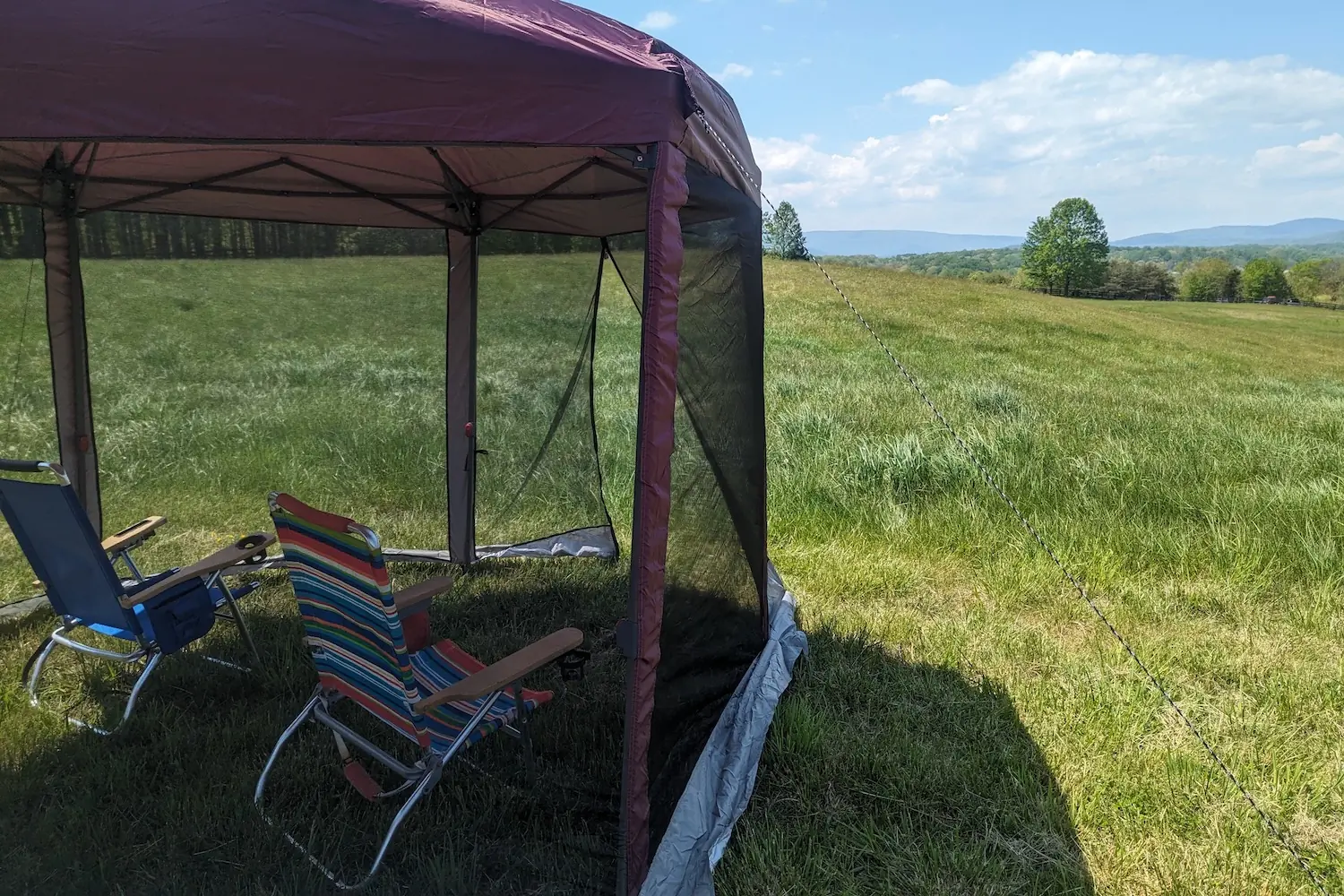



Price & Value
The canopy tents we tested cost between $140 and $450. As with most other outdoor gear, we found a relationship between price and quality, but in the case of canopy tents, the type of tent makes a difference as well. In general, pop-up canopies are a bit simpler and, therefore, more affordable. Even then, the models we tested cost between $140 and $275.
Budget
If you’re operating on a budget, the most affordable model we tested, the Crown Shades 10 x 10 ($140), absolutely gets the job done. The primary difference between it and the much more expensive Eurmax 10 x 10 ($260) is the quality of materials and construction. If you’re a less frequent user, the Crown Shades will likely serve you just fine. If you’re a heavy canopy user or just want yours to last for years, then the Eurmax is probably the way to go.
Mid-Tier
You’ll pay a bit more for quality and durability, as is the case with the Eurmax 10 x 10 ($260) mentioned above. The canopy material, poles, and connections are all simply more robust, which accounts for the higher price tag.
Special features also tend to add to the price. For example, the Coleman Back Home ($275) comes equipped with screen walls. This makes it less surprising that it costs a bit more than a simpler model like the Coleman Oasis ($190). Similarly, the Neso Party Tent ($300) provides double the amount of coverage of the pop-ups we tested in a super portable and versatile package, so its $300 asking price seems fairly reasonable.
Premium
Some of the more niche canopies made by industry-leading tent manufacturers are also on the higher end of the price scale. Not only is the Big Agnes Sage Canyon Shelter Deluxe ($450) impressively light and portable, but it is also made with high-end materials and poles that help to make it that way. If packability and quality are high on your list of priorities, you may end up paying a bit more for it.
Frequently Asked Questions
How long does it take to set up a pop-up tent?
Set-up time varies based on the tent style, location, and how many people are on hand to help. Traditional pop-ups with rigid frames spread easily with two people, but if you’re alone, you’ll have to crawl beneath and push the center up. Or, in the case of the Eurmax, you’ll have to go corner to corner pushing the supports up until they latch.
The tent pole style options, like the Eureka Tagalong, take about ten minutes once you’ve gotten the hang of it. The Back Home is up in a jiffy, but you have to spend extra time extending and staking the guy lines. In general, we’d recommend setting aside about thirty minutes if you’re setting up a pop-up tent for the first time. Once you’ve developed an efficient system, they can be up and secured in as little as ten minutes or less.
How sustainable are pop-up tents?
Unfortunately, like a lot of outdoor gear, most pop-up tent materials aren’t recyclable. The nylon and canvas canopies don’t have much use beyond their intended purpose, whereas steel posts and legs could be repurposed at a scrap yard, and stakes and guy-lines are always good to keep around.
We weren’t able to find any options that use recycled materials, which most-likely comes down to the difficulty of manufacturing recycled, water-resistant canopies that are guaranteed to hold up to extended use. With that in mind, proper care and anchoring can ensure a long life for a pop-up tent, meaning you can get extended use and pass it on if you decide to upgrade.
How can I get the most life out of my pop-up tent?
Proper assembly and disassembly are probably the most important factors for durability, but other factors do come into play. If your kids are hanging from the supports, you’ll compromise the frame’s integrity. Likewise, if you’re setting up the tent in a hurry and don’t notice an obstruction preventing a leg from extending, pushing up on the tent can potentially cause irreparable damage to the frame.
Anchoring is also crucial. Pop-up tents are meant to stay on the ground, and once they go airborne in a windstorm, all bets are off. It’s also very important to pack up the tents properly. Folding the canopy neatly can minimize wrinkling and eventual cracking, and proper packing around the frame can prevent snags when you unpack it the next time.
Related Content
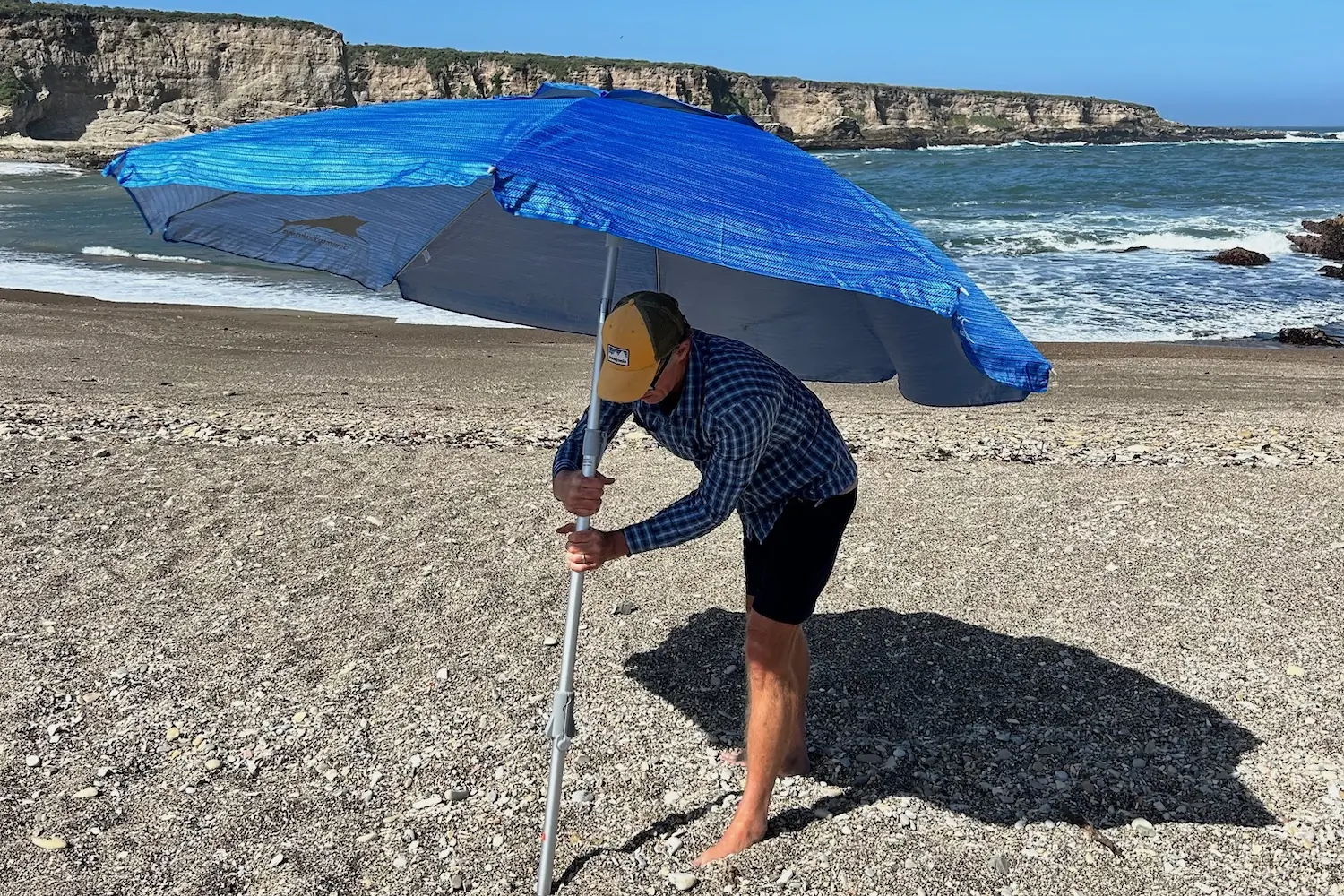

The Best Beach Umbrellas of 2025
We tested eight of the best beach umbrellas and shades on the market to help you find the best option to keep you protected from the sun.
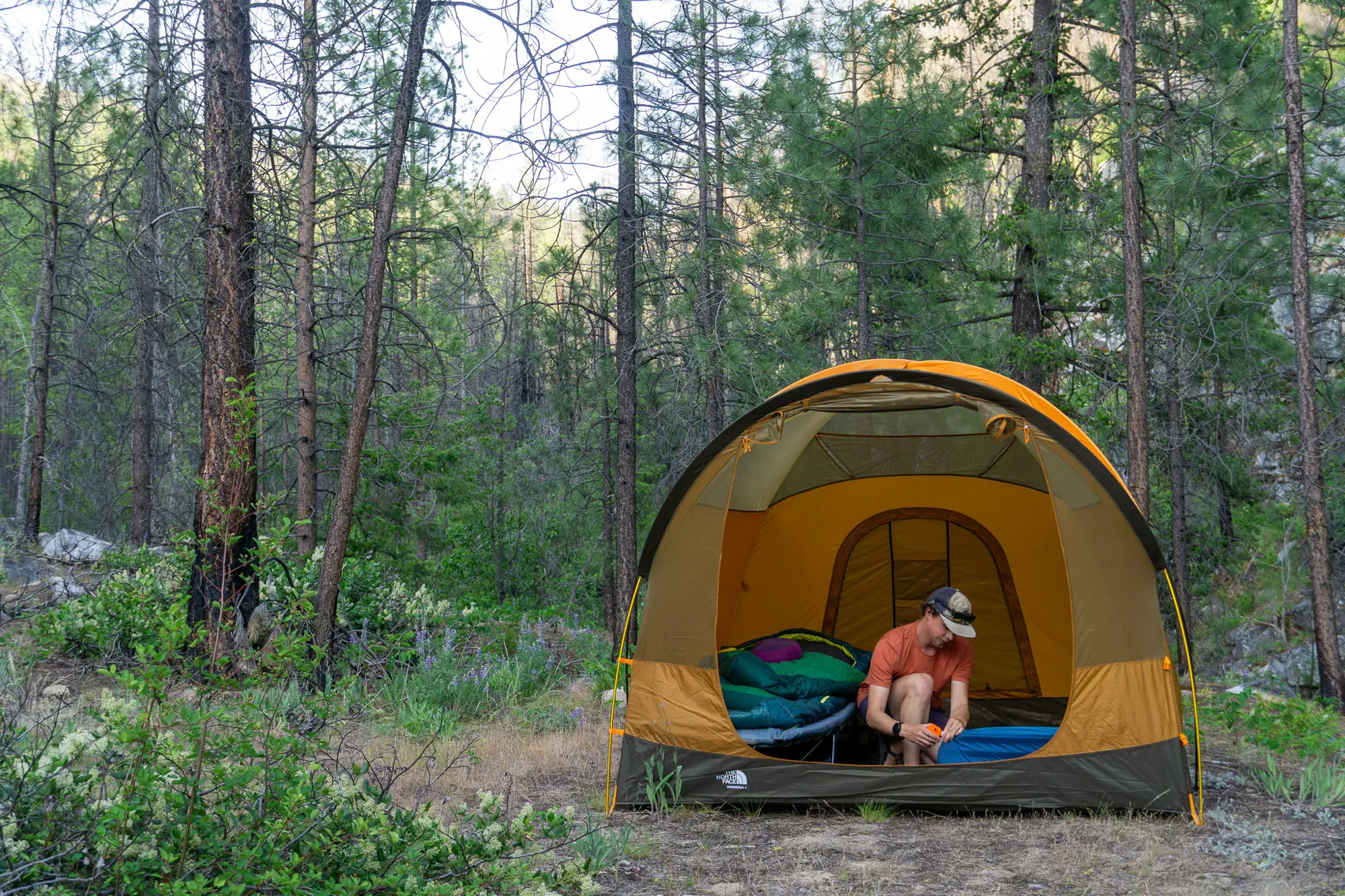

The Best Camping Tents of 2026
We make finding the right camping tent easier for you by bringing you the best camping tents of 2025. Check out our top picks from REI Co-op, Kelty, NEMO, and more.
